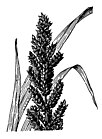Note: This is a project under development. The articles on this wiki are just being initiated and broadly incomplete. You can Help creating new pages.
Difference between revisions of "Echinochloa frumentacea"
| (2 intermediate revisions by the same user not shown) | |||
| Line 1: | Line 1: | ||
| − | + | [[File:Echinochloa frumentacea.jpg|thumb|right]] | |
| − | + | '''Echinochloa frumentacea''' is a robust, erect, clump-forming grass producing culms 30 - 200cm tall. The plant is sometimes harvested from the wild for local use of its edible seed. It is sometimes cultivated, especially in India and E. Asia for it's seed, especially in areas where rice will not grow. | |
==Uses== | ==Uses== | ||
| − | {{Uses|}}, {{Uses| | + | {{Uses|Biliousness}}, {{Uses|Constipation}}. |
==Parts Used== | ==Parts Used== | ||
| − | {{Parts Used| | + | {{Parts Used|Seeds}}. |
==Chemical Composition== | ==Chemical Composition== | ||
| Line 17: | Line 17: | ||
===Dravya=== | ===Dravya=== | ||
===Rasa=== | ===Rasa=== | ||
| − | |||
===Guna=== | ===Guna=== | ||
| Line 30: | Line 29: | ||
==Habit== | ==Habit== | ||
| − | {{Habit|}} | + | {{Habit|Annual}} |
==Identification== | ==Identification== | ||
| Line 49: | Line 48: | ||
==Mode of Propagation== | ==Mode of Propagation== | ||
| − | {{Propagation|}} | + | {{Propagation|Seeds}} |
==How to plant/cultivate== | ==How to plant/cultivate== | ||
| − | <ref name="How to plant/cultivate"/> | + | Japanese millet is an annual plant that can succeed in a wide range of environments from the temperate zone to the tropics. It can be found at elevations up to 1,500 metres.<ref name="How to plant/cultivate"/> |
==Commonly seen growing in areas== | ==Commonly seen growing in areas== | ||
| − | {{Commonly seen| | + | {{Commonly seen|Wild areas}}. |
==Photo Gallery== | ==Photo Gallery== | ||
<gallery class="left" caption="" widths="140px" heights="140px"> | <gallery class="left" caption="" widths="140px" heights="140px"> | ||
| − | + | Echinochloa frumentacea.jpg | |
| + | Echinochloa frumentacea (Japanhirse) HC-1950.jpg | ||
</gallery> | </gallery> | ||
| Line 65: | Line 65: | ||
<references> | <references> | ||
| − | <ref name="chemical composition">[" | + | <ref name="chemical composition">[Chemistry]</ref> |
| + | |||
| + | <ref name="Leaf">[Morphology]</ref> | ||
| − | <ref name=" | + | <ref name="How to plant/cultivate">[http://tropical.theferns.info/viewtropical.php?id=Echinochloa%20frumentacea Cultivation]</ref> |
| − | |||
| − | |||
</references> | </references> | ||
==External Links== | ==External Links== | ||
| − | * [ ] | + | * [https://www.sciencedirect.com/topics/agricultural-and-biological-sciences/echinochloa-frumentacea Echinochloa frumentacea on sciencedirect.com] |
| − | * [ | + | * [https://pfaf.org/user/Plant.aspx?LatinName=Echinochloa+frumentacea Echinochloa frumentacea on pfaf.org] |
| − | |||
[[Category:Herbs]] | [[Category:Herbs]] | ||
[[Category:Pages without herbs images]] | [[Category:Pages without herbs images]] | ||
Latest revision as of 12:08, 30 April 2020
Echinochloa frumentacea is a robust, erect, clump-forming grass producing culms 30 - 200cm tall. The plant is sometimes harvested from the wild for local use of its edible seed. It is sometimes cultivated, especially in India and E. Asia for it's seed, especially in areas where rice will not grow.
Contents
- 1 Uses
- 2 Parts Used
- 3 Chemical Composition
- 4 Common names
- 5 Properties
- 6 Habit
- 7 Identification
- 8 List of Ayurvedic medicine in which the herb is used
- 9 Where to get the saplings
- 10 Mode of Propagation
- 11 How to plant/cultivate
- 12 Commonly seen growing in areas
- 13 Photo Gallery
- 14 References
- 15 External Links
Uses
Parts Used
Chemical Composition
Common names
| Language | Common name |
|---|---|
| Kannada | |
| Hindi | |
| Malayalam | |
| Tamil | |
| Telugu | |
| Marathi | |
| Gujarathi | |
| Punjabi | |
| Kashmiri | |
| Sanskrit | |
| English |
Properties
Reference: Dravya - Substance, Rasa - Taste, Guna - Qualities, Veerya - Potency, Vipaka - Post-digesion effect, Karma - Pharmacological activity, Prabhava - Therepeutics.
Dravya
Rasa
Guna
Veerya
Vipaka
Karma
Prabhava
Habit
Identification
Leaf
| Kind | Shape | Feature |
|---|---|---|
Flower
| Type | Size | Color and composition | Stamen | More information |
|---|---|---|---|---|
| {{{5}}} |
Fruit
| Type | Size | Mass | Appearance | Seeds | More information |
|---|---|---|---|---|---|
Other features
List of Ayurvedic medicine in which the herb is used
Where to get the saplings
Mode of Propagation
How to plant/cultivate
Japanese millet is an annual plant that can succeed in a wide range of environments from the temperate zone to the tropics. It can be found at elevations up to 1,500 metres.[3]
Commonly seen growing in areas
Photo Gallery
References
- ↑ [Chemistry]
- ↑ [Morphology]
- ↑ Cultivation


